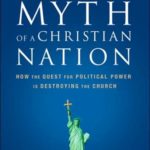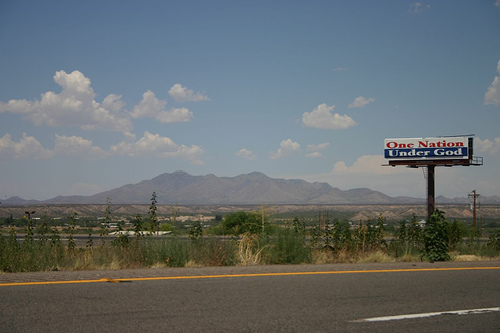We run our website the way we wished the whole internet worked: we provide high quality original content with no ads. We are funded solely by your direct support. Please consider supporting this project.
Is America Uniquely “Under God”?
As a rallying slogan for our civil religion, the proclamation that we are “one nation under God” arguably serves a useful social function, for it gives many Americans a sense of shared values and vision. But it is not a slogan kingdom people in America should take too seriously. We must always remember that, while some nations serve law and order better than others, the powers that govern all nations are to a significant extent corrupted by the polluting influence of Satan. We should know that part of this influence is manifested in violent, nationalistic pride, often buttressed by a nationalistic religion. We are to live in such a way that we manifest the radical difference between the kingdom of God and every version of the kingdom of the world. Our job, in other words, is to manifest the holiness of the kingdom of God, and that is how we are to be a light of hope to the world.
When the theocratic-sounding slogan “one nation under God” is taken too seriously, it makes people think of America along the lines of Israel and the Old Testament rather than Jesus and the New Testament. But there are at least two conceptual problems with the Israel-theocratic paradigm.
First, there is no reason to believe America ever was a theocracy. Unlike Israel, we have no biblical or empirical reason to believe God ever intended to be king over America in any unique sense. True, some of those who were part of the original European conquest of this continent claim this, but why believe they are right?
Undoubtedly, part of the reason some Christians accept this claim is the fact that fallen humans have always tended to fuse religious and nationalistic and tribal interests. We want to believe that God is on our side, supports our causes, protects our interest, and ensures our victories — which, in one form or another, is precisely what most of our nationalistic enemies also believe. So it has been for most people throughout history.
The second fundamental problem with viewing America as a theocracy is that God’s theocratic program in the Old Testament was temporary, conditional—and ultimately abandoned. God formed Israel to be a distinct, set apart, holy people in order to use them to reach the whole world. Through the descendants of Abraham, all the families of the world were to be blessed (Gen 12:2-3). The Israelites were to be God’s ministers, his priests to the world. God took great pains (and inflicted great pains) to get his people into the “the Promised Land” because it was strategic in accomplishing this global mission.
This nationalistic program, however, never worked well, and Israel eventually demanded an earthly king like other nations. Many of their leaders didn’t listen to God and drove the country into ruin. Even more tragically, Israel forgot that its unique calling was not an end in itself. They were supposed to be set apart from the world so that they could effectively serve the world. But like so much of the church today, they became prideful of their unique holiness and judgmental of the people they were called to serve.
God, therefore, abandoned this nationalistic means of transforming the world. While God is by no means through with Israel, he is no longer using them or any other nation to grow his kingdom on the earth. The kingdom is now growing through Jesus Christ who lives in and through his corporate body.
Unlike the nation of Israel, This new “royal priesthood” (one Peter 2:9) is not to be conditioned by any nationalistic, ethnic, or ideological alliances. To the contrary, it is to be comprised of people from every tribe and every nation. Through his death and resurrection, Jesus utterly abolished all the typical kingdom-of-the-world categories that divide people: nation, race, gender, social, and economic status, and so on. And inasmuch as the church is called to manifest everything Jesus died for, manifesting this divisionless “new humanity” lies at the heart of the kingdom commission.
In light of this, we must conclude that any suggestion that God has returned to his Old Testament theocratic mode of operation — as in raising up America as a uniquely favored nation — is not only unwarranted, it is a direct assault on the distinct holiness of Jesus Christ and the kingdom he died to establish. While one may or may not contend that America wields the sword more justly than most other versions of the kingdom of the world, under no circumstances is a kingdom-of-God participant justified in claiming that it is a nation that is more “under God” than any other nation in the world.
—adapted from Myth of a Christian Nation, pages 147-153
Category: General
Tags: America, Myth of a Christian Nation, National Idolatry, Nationalism, Theocracy
Topics: Ethical, Cultural and Political Issues
Related Reading

Remembering the Myth During Election Season
Given the current political furor in America right now, we thought we would post an extended quote from Greg’s book The Myth of a Christian Nation. This book was originally a reflection on Christian political engagement during the 2004 election, and how conflating “America” with Christianity is devastating to the mission we’ve been given in the…

Does Romans 13 Condone Government Violence? (podcast)
Greg deconstructs problematic interpretations of Romans 13. Episode 649 http://traffic.libsyn.com/askgregboyd/Episode_0649.mp3

Nations and Violence
In this video by The Work of the People, Greg shares why there is no such thing as a Christian nation. Nations are not the kind of things that turn the other cheek, love their enemies, or lay down their sword as Jesus commanded. They exist because they use the sword. Nations and violence go…

How the Church is Tempted to “Do Good”
The previous post spoke of God’s call to the church to be resident aliens: a holy, distinct people who are set apart and peculiar when compared to the patterns of the world. The holiness of God’s kingdom is cruciform love, which constitutes our distinct witness to the world. Preserving this holiness and resisting the Devil’s…

Christians & Politics: Where Do You Stand?
In the 1980’s, Cal Thomas and Ed Dobson were leaders in the Moral Majority, a conservative evangelical social and political movement that attempted to rally “moral” people to change public policy. The movement died out in the 1990s. In 1999, Thomas and Dobson wrote a book entitled Blinded by Might in which they declare that…

Is America Uniquely Favored by God?
The tendency of wealth to entrap people in greed has been confirmed in numerous studies. Research has consistently shown that, generally speaking, the more people have, the less percentage of their income they tend to give away. This is even reflected on a national level in the case of America. In 2000, the gap between…

